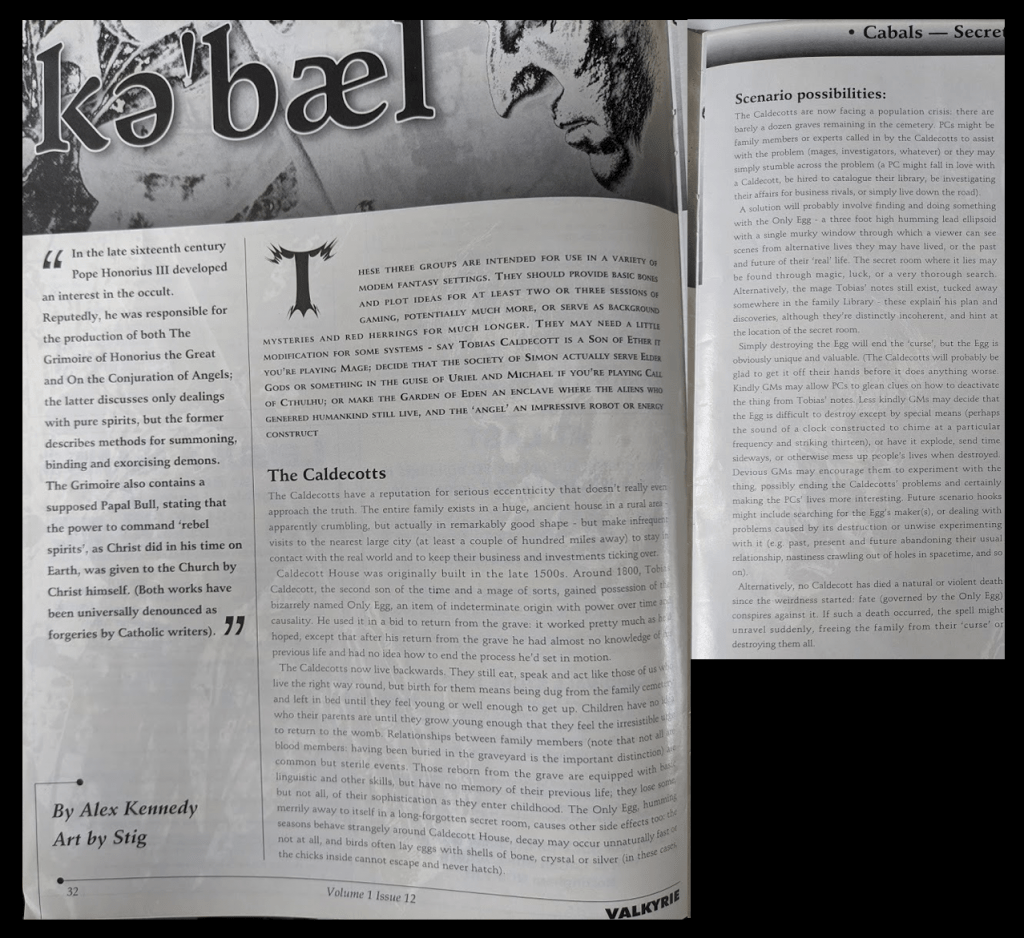
/kəˈbal/, Part 1: The Caldecotts
The following is an extract from an article Alexis wrote decades ago, in 1996, for British roleplaying magazine Valkyrie. It’s juvenilia, and some bits make him wince – but it’s an insight into his early style and fiction which later became Fallen London, Sunless Sea and Cultist Simulator. [ Part 2, Part 3 ]

These three groups are intended for use in a variety of modern fantasy settings. They should provide basic bones and plot ideas for at least two or three sessions of gaming, potentially much more, or serve as background mysteries and red herrings for much longer. They may need a little modification for some systems – say Tobias Caldecott is a Son of Ether if you’re playing Mage; decide that the Society of Simon actually serve Elder Gods or something in the guise of Uriel and Michael if you’re playing Call of Cthulhu; or make the Garden of Eden an enclave where the aliens who engineered humankind still live, and the ‘angel’ an impressive robot or energy construct.
The Caldecotts
The Caldecotts have a reputation for serious eccentricity that doesn’t really even approach the truth. The entire family exists in a huge, ancient house in a rural area – apparently crumbling, but actually in remarkably good shape – but make infrequent visits to the nearest large city (at least a couple of hundred miles away) to stay in contact with the real world and to keep their business and investments ticking over.
Caldecott House was originally built in the late 1500s. Around 1800, Tobias Caldecott, the second son of the time and a mage of sorts, gained possession of the bizarrely named Only Egg, an item of indeterminate origin with power over time and causality. He used it in a bid to return from the grave: it worked pretty much as he’d hoped, except that after his return from the grave he had almost no knowledge of his previous life and no idea how to end the process he’d set in motion.
The Caldecotts now live backwards. They still eat, speak and act like those of us who live the right way round, but birth for them means being dug from the family cemetery and left in bed until they feel young or well enough to get up. Children have no idea who their parents are until they grow young enough that they feel the irresistible urge to return to the womb. Relationships between family members (note that not all are blood members: having been buried in the graveyard is the important distinction) are common but sterile events. Those reborn from the grave are equipped with basic linguistic and other skills, but have no memory of their previous life; they lose some, but not all, of their sophistication as they enter childhood. The Only Egg, humming merrily away to itself in a long-forgotten secret room, causes other side effects too: the seasons behave strangely around Caldecott House, decay may occur unnaturally fast or not at all, and birds often lay eggs with shells of bone, crystal or silver (in these cases, the chicks inside cannot escape and never hatch).
Scenario possibilities
The Caldecotts are now facing a population crisis: there are barely a dozen graves remaining in the cemetery. PCs might be family members or experts called in by the Caldecotts to assist with the problem (mages, investigators, whatever) or they may simply stumble across the problem (a PC might fall in love with a Caldecott, be hired to catalogue their library, be investigating their affairs for business rivals, or simply live down the road).
A solution will probably involve finding and doing something with the Only Egg – a three foot high humming lead ellipsoid with a single murky window through which a viewer can see scenes from alternative lives they may have lived, or the past and future of their ‘real’ life. The secret room where it lies may be found through magic, luck, or a very thorough search. Alternatively, the mage Tobias’ notes still exist, tucked away somewhere in the family Library – these explain his plan and discoveries, although they’re distinctly incoherent, and hint at the location of the secret room.
Simply destroying the Egg will end the ‘curse’, but the Egg is obviously unique and valuable. (The Caldecotts will probably be glad to get it off their hands before it does anything worse. Kindly GMs may allow PCs to glean clues on how to deactivate the thing from Tobias’ notes. Less kindly GMs may decide that the Egg is difficult to destroy except by special means (perhaps the sound of a clock constructed to chime at a particular frequency and striking thirteen), or have it explode, send time sideways, or otherwise mess up people’s lives when destroyed. Devious GMs may encourage them to experiment with the thing, possibly ending the Caldecotts’ problems and certainly making the PCs’ lives more interesting. Future scenario hooks might include searching for the Egg’s maker(s), or dealing with problems caused by its destruction or unwise experimenting with it (e.g. past, present and future abandoning their usual relationship, nastiness crawling out of holes in spacetime, and so on).
Alternatively, no Caldecott has died a natural or violent death since the weirdness started: fate (goverened by the Only Egg) conspires against it. If such a death occurred, the spell might unravel suddenly, freeing the family from their ‘curse’ or destroying them all.



Neat.